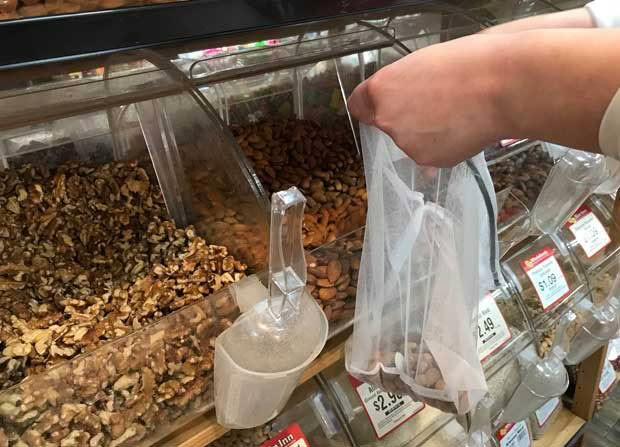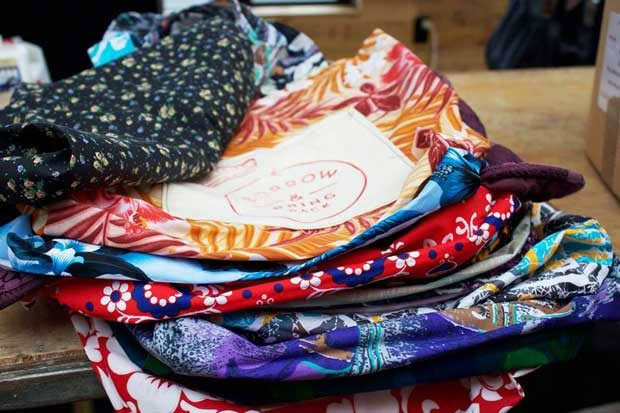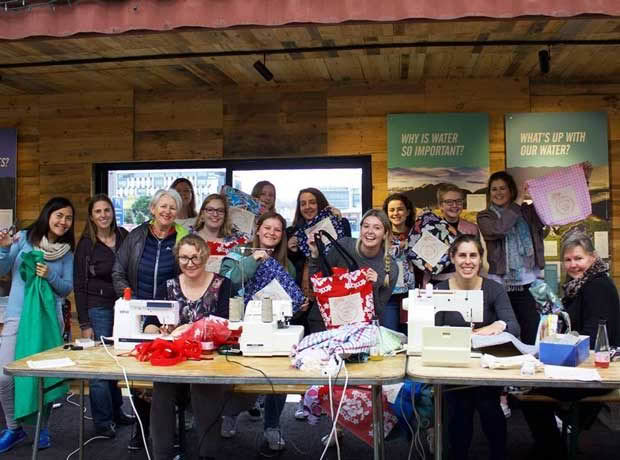Plastic free grocery shopping made easy: Eco experts share tips on how to cut down plastic waste

Liam Prince and Hannah Blumhardt. Photo by Heloise and Solene from News & Land
Yes, you can cut down on plastic waste. All it takes is a little planning to change to more eco-friendly habits
Words: Nicole Barratt Photos supplied
The thought of a plastic-free grocery shop can be daunting. No dumping pre-packaged apples or plastic-wrapped pork chops in the trolley, and just keep on walking past the plastic paradise that is the biscuit aisle. But a plastic-free shop shouldn’t be feared: it can be simple with a bit of preparation.
Liam Prince and Hannah Blumhardt are plastic-free shopping experts, having sent nothing to landfill in three years. The Wellington couple are traveling the country with their zero-waste roadshow, The Rubbish Trip. “It was a bit of a mission to move away from the way we’ve always done things, but it’s easier than you think,” Liam says.
For starters, here are three things you need to take along on your next shopping expedition: reusable bags for packing groceries at the counter, smaller reusable bags for fruit and vegetables, and containers/jars for bulk-bin foods.

Using a mesh produce bag in the supermarket bulk bin section is one easy way to reduce plastic use.
“One thing we emphasize is using what you already have. If you took any house in New Zealand and shook it upside down, hundreds of bags, containers and Tupperware would fall out,” Hannah says.
Shoppers have got the hang of taking reusable bags for the final pack at the counter, but smaller plastic bags used when handpicking produce are often forgotten, Liam says. Swapping to net or cotton bags with a drawstring is an easy switch.
Muesli bars, cookies and crackers are some of the biggest plastic culprits, many with both an outer layer of plastic and tray of packaging inside. Hannah suggests making these snacks at home – oat crackers and “I have nothing in my pantry and no time to spare” muesli bars regularly feature in the couple’s snack tin.
Also, be open to shopping in places other than supermarkets. “Bulk-food stores are a great place to get staples like legumes, flours, rice, and spices; the kind of things that are difficult to find without plastic in a supermarket,” says Hannah.
Stores such as Bin Inn encourage customers to bring their own containers to fill, be it old ice-cream tubs or jars ( just have them weighed at the counter before they’re filled.) There are machines which grind peanut butter, baking needs such as sugar in bulk bins, and dispensers to fill up containers with dishwashing liquid and washing powder.
Another thing. Liam says butchers are generally happy to put meat into a container brought from home. “People don’t realize the power they have. Just ask them – business owners can’t read customers’ minds.” Supermarkets can be hesitant to put meat into customers’ own containers, sometimes citing health and safety reasons. “But just explain that you’re trying to reduce your plastic waste – some New World supermarkets are starting to be receptive to this.”

Boomerang bags
For milk, there are companies dotted across New Zealand (such as Milk & More in Nelson) with a reusable glass bottle system. You can also get milk powder in bulk bins, or make plant milk with seeds and nuts.
Hannah says the trick to shopping plastic free is about creating better habits. It may feel odd reaching for a cotton produce bag over plastic or asking a butcher to put chicken drumsticks in Tupperware, but it will soon feel normal.
And don’t feel the need to rush out and buy new reusable bags to kickstart a plastic-free journey – they can be borrowed through the reusing initiative, Boomerang Bags. Thousands of bags have been sewn from discarded fabric and left for use in shops across the country, from Kaitaia to Stewart Island.
Wellington’s coordinator, Ali Kirkpatrick, says Boomerang Bags encourages participation in the sharing economy. “We want people to use them, bring them back and reuse them. Some do tend to forget to bring them back, so it’s about creating that habit of remembering them.” She recommends sticking a ‘bring your bags’ note on the car dashboard as a reminder.

HANNAH AND LIAM’S EASY TIPS TO CUT DOWN ON PLASTIC
1. Keep reusable containers and bags in your car to shop with. Look at home first for bags/jars to use instead of buying new
2. Don’t feel the need to cut out plastic out completely. Think about the ‘worst offenders’ in your home and make small changes first. For example: instead of buying individual yoghurt pots, buy a large tub and serve it in your own containers
3. Consider a bamboo toothbrush that’s compostable next time you need a new one
4. Use soap and shampoo in bar form instead of liquid
5. Take your own container to buy coffee beans at the local roasters instead of buying coffee in plastic
6. If you’re buying lunch for work (like sushi), take a lunchbox to put it in
7. Visit farmers’ markets to find plenty of plastic-free produce such as bread and cheese
8. Use The Rubbish Trip’s regional shopping guide for plastic-free shopping options across New Zealand
READ MORE
Mind your own beeswax: The Hawke’s Bay couple making it easy to wrap food without plastic
Reduce your plastic consumption and make your own natural cleaning products
Reduce your plastic consumption and make your own natural cleaning products
Sustainable food producers thinking outside the box on Great Barrier Island

